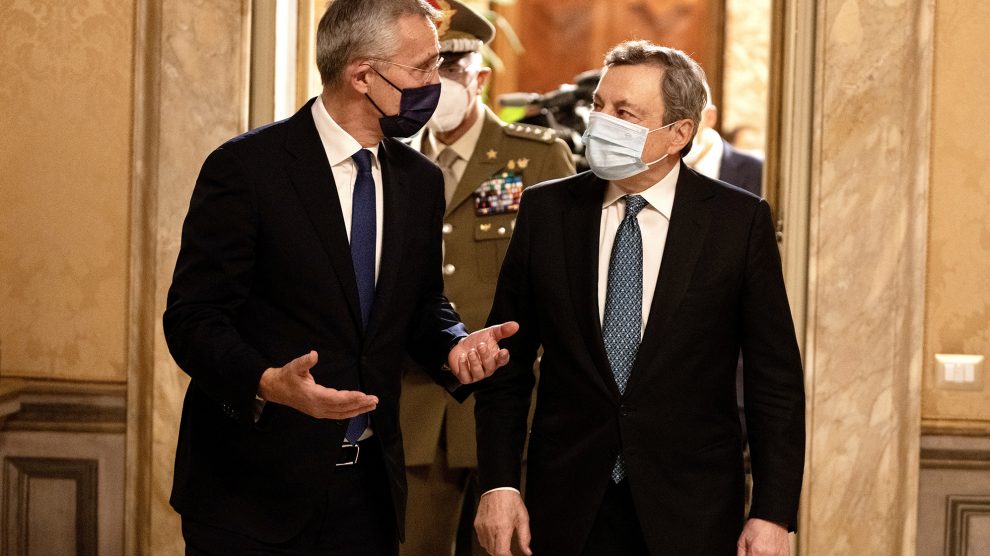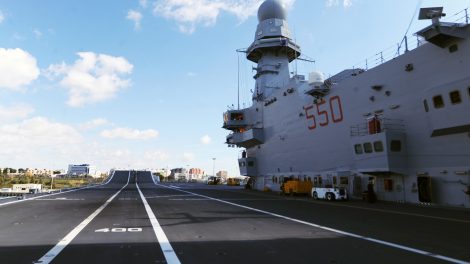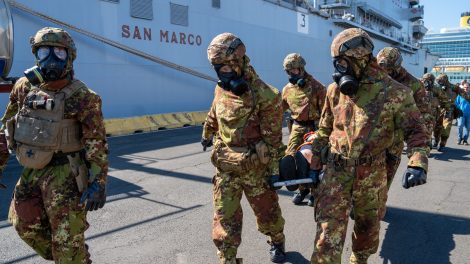NATO’s Secretary-General Jens Stoltenberg is in Rome for a series of key events, including the Alliance’s Industry Forum – held in Rome for the first time – and celebrations for NATO Defense College’s 70 years. Firstly, though, he stopped by Palazzo Chigi for an “important meeting” with Prime Minister Mario Draghi on Wednesday.
“I thanked him for Italy’s major contribution to NATO,” tweeted Mr Stoltenberg later, adding that talks included the situations on NATO’s Eastern and Southern borders, “our partnership with the EU and how we can further strengthen the Transatlantic bond.”
The PM’s office then indicated that “the most important international developments for Euro-Atlantic security and the NATO adaptation process” were discussed in-depth, as well as the role of the Atlantic Alliance in the Mediterranean. All with an eye on NATO’s next conference in Madrid, on June 29-30, 2022.
“The meeting between Secretary-General Stoltenberg and PM Draghi is a clear sign of the strategic role that Italy can play in Transatlantic relations in the immediate future, if it wishes to,” commented Gabriele Natalizia, geopolitical expert and coordinator of Geopolitica.info, an Italian think tank. The expert remarked that the central themes touched on in the meeting were NATO’s partnership with the EU and the relationship with the US.
In the face of the French idea of ‘strategic autonomy’ and the irritation it causes in the White House, Mr Natalizia told Decode39, Italy – which has become the second biggest military power in the EU after Brexit – may leverage its position “to relaunch itself as the main European interlocutor of the US and, at the same time, obtain the promise of NATO’s greater commitment to its Southern Flank in the process of drafting the new Strategic Concept.”
Other commentators have taken heed of the peculiar timing. Just two days before Mr Stoltenberg’s trip to Rome, the EU’s defence ministers were poring over the first draft of the bloc’s Strategic Compass, a future guiding light to drive the EU towards its much-discussed strategic autonomy. What to make of this in light of the Atlantic Alliance is among the most delicate issues.
The prevalent mood in that discussion hinged on further integration between NATO and the EU’s approach, rather than the opposite. Promoting full synergy between respective ambitions and avoiding duplications and overlapping. Italy fully upheld this approach: among the participants walking this line from the get-go was Italian Defence Minister Lorenzo Guerini.
Hence, the debate is now moving towards interior reflections both in NATO and the EU – through the Strategic Concept and the Strategic Compass, respectively. And the aim is to interlace those two debates, including through a joint declaration that’s expected before year’s end.
The NATO Industry Forum
Italy’s newfound centrality in the Transatlantic plain has been recently highlighted by Loren Thompson, an American national security expert, on Forbes. Amid shifting balances within NATO, complex geopolitical scenarios and bouts of instability in the wider Mediterranean area, Rome is increasingly being regarded as a trustworthy partner whose unique position, international stances, advanced army and defence industry are key assets within the Alliance.
All this heightens the significance of Rome hosting for the first time ever the NATO Industry Forum, an event organised by the Alliance’s Allied Command Transformation (ACT) and geared towards advancing its understanding and use of new technologies. Through dialogues on capability planning, development and delivery, as well as procurement practices, industrial partners may contribute to the debate around the Strategic Concept.
Authoritative participants from the manufacturing sector, including the CEOs of Lockheed Martin, Jim Taiclet, and Leonardo, Alessandro Profumo, underscored the value of the Industry Forum as an opportunity to discuss technological innovation and public-private partnerships.
“ACT, and NATO as a whole, needs industry to help it maintain this new defence and security ecosystem,” said General Philippe Lavigne, head of ACT, during his opening remarks. “We face an uncertain future, but we face it together. My message is, therefore: let us be bold enough to embrace innovation, smart enough to grow our agility, and open enough to learn from Allies’ industries. We can win only by working together, as a team, and I am excited about that shared future.”
Alongside him was General Luciano Portolano, Secretary-General of the Italian Defence, in one of his first appearances since he took the job. “In a rapidly changing international environment, the Alliance’s ability to create innovation, including in the defence field, is synonymous with strategic advantage,” he said; “today we share the need to create a new cooperation with the aim of rationalising resources and creating the necessary strategies between allies and supranational entities.”




